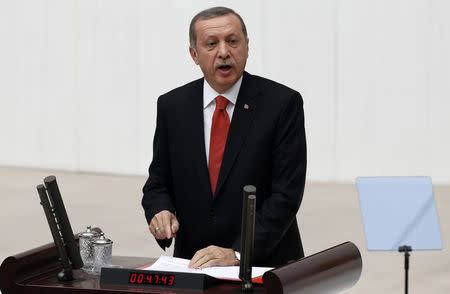Government-backed candidates win in Turkish judicial vote

By Orhan Coskun and Dasha Afanasieva ANKARA (Reuters) - Government-backed candidates won most seats in a top Turkish judicial body, election results showed on Monday, tightening President Tayyip Erdogan's control over the judiciary in a victory over his rival Fethullah Gulen. Eight out of 10 seats were won by candidates supported by Erdogan, who has pledged to purge the influence of Gulen, a cleric and ally-turned-foe whom the president accuses of trying to build up a parallel power base in the country. But the outcome of Sunday's vote fuelled opposition accusations that the separation of powers was being eroded in Turkey, echoing concerns voiced by the European Union last week about political interference in the judiciary. Erdogan says Gulen, living in self-imposed exile in the United States, has used influence in the judiciary to try to seize the levers of state power. Gulen denies the accusations. The vote by some 14,000 judges and prosecutors for 10 of the 22 members of the High Board of Judges and Prosecutors council (HSYK) was seen as critical to Erdogan's efforts to curb the power of Gulen's Hizmet, or service, movement. "The winners of this election are our people, our country, and justice. With its independent structure, HSYK will walk towards the future with a formation that solves the problems of the judiciary," Erdogan said in a speech at Marmara University. The HSYK council is responsible for appointments, transfers, promotions and expulsions within the judiciary. The two other winning candidates were close to Gulen, according to Hurriyet newspaper. The president appoints four members of the council and combined with other government-backed appointees this would add up to 15 members viewed as sympathetic to the government, local media said. "President Erdogan is now in a strong position to further change the composition of the judiciary and intensify the campaign against Gulenist supporters," said Fadi Hakura at the London-based think tank Chatham House. Thousands of police officers and hundreds of judges and prosecutors have been purged or reassigned since December, when a high profile corruption scandal engulfed key members of the government and brought a feud between Hizmet, which was influential in the judiciary, and the AKP out into the open. A senior justice ministry official said "the parallel structure was completely eliminated" by the election, but he denied that the ruling AK Party backed the eight of those elected by a block sympathetic to the government. "They say it's a government-backed bloc but this bloc contains social democrats, nationalists and conservatives. These groups came together and prevented the formation of tutelage over the HSYK," the official said, declining to be named. DIVORCE Erdogan, who is looking to create an executive presidency in Turkey, accuses Gulen of building influence in the judiciary and police to try to unseat him. On Saturday he promised further steps in the fight, saying the parliament will address this after it reopens on Tuesday. The AK Party and Gulen's movement used to be allies, joining forces to battle those allegedly involved in secularist coup plots known as "Ergenekon" and "Sledgehammer". But a bitter rift became public last year when Erdogan moved to close Hizmet's preparatory schools. Erdogan blamed Gulen for orchestrating the graft scandal and sought to strip away Hizmet's power. Legislation in February boosted government influence over the HSYK but some articles of the law were subsequently cancelled by the constitutional court. "It's been like a divorce or a separation between two lovers. And you know when two lovers separate it's a kind of hatred and that's usually caused by betrayal. That's why Erdogan is so angry," Hursit Gunes, a deputy from the main opposition Republican People's Party told Reuters. The European Union last week chastised EU candidate Turkey for political interference in the judiciary, saying its response to the corruption scandal had damaged judicial independence and weakened civil rights. "It shows that the rule of separation of power is being destroyed. Constitutionally there has to be a separation of power and the judicial system has to be impartial and apolitical," Gunes told Reuters. None of the candidates nominated by a secularist association of judges and prosecutors won a seat, the election results showed. (Writing by Dasha Afanasieva; Additional reporting by Ece Toksabay and Humeyra Pamuk; Editing by Daren Butler and Dominic Evans)

